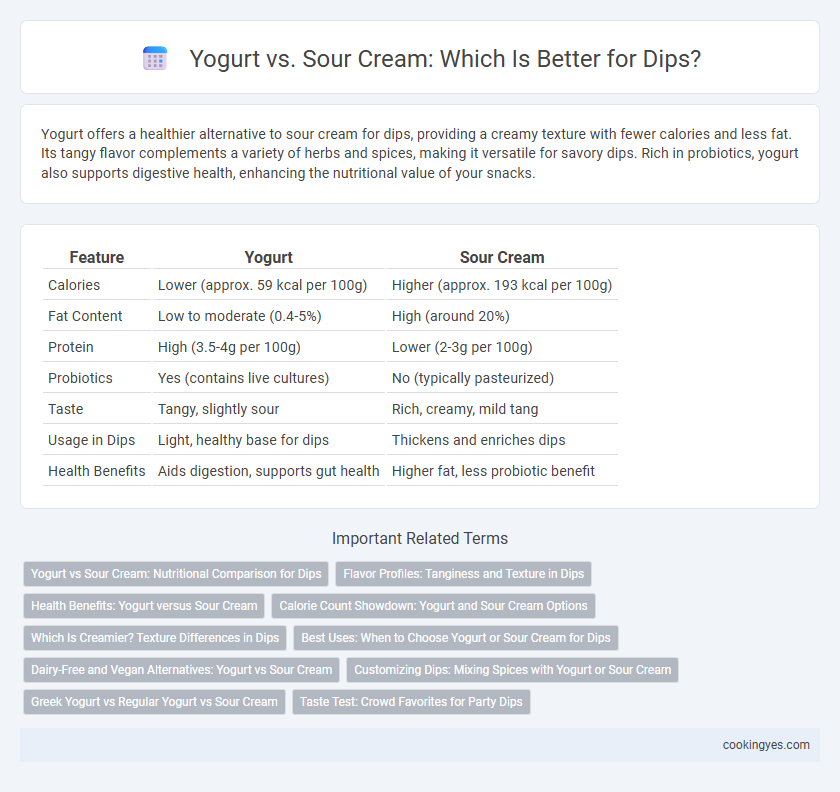Yogurt offers a healthier alternative to sour cream for dips, providing a creamy texture with fewer calories and less fat. Its tangy flavor complements a variety of herbs and spices, making it versatile for savory dips. Rich in probiotics, yogurt also supports digestive health, enhancing the nutritional value of your snacks.
Table of Comparison
| Feature | Yogurt | Sour Cream |
|---|---|---|
| Calories | Lower (approx. 59 kcal per 100g) | Higher (approx. 193 kcal per 100g) |
| Fat Content | Low to moderate (0.4-5%) | High (around 20%) |
| Protein | High (3.5-4g per 100g) | Lower (2-3g per 100g) |
| Probiotics | Yes (contains live cultures) | No (typically pasteurized) |
| Taste | Tangy, slightly sour | Rich, creamy, mild tang |
| Usage in Dips | Light, healthy base for dips | Thickens and enriches dips |
| Health Benefits | Aids digestion, supports gut health | Higher fat, less probiotic benefit |
Yogurt vs Sour Cream: Nutritional Comparison for Dips
Greek yogurt contains more protein and fewer calories than sour cream, making it a healthier base for dips. It also provides probiotics that support gut health, whereas sour cream is higher in saturated fat and lacks beneficial bacteria. Choosing yogurt as a dip ingredient boosts nutritional value while maintaining creamy texture and tangy flavor.
Flavor Profiles: Tanginess and Texture in Dips
Yogurt offers a bright tanginess with a creamy yet slightly runny texture that enhances dip freshness and lightness, while sour cream provides a milder tang and a thicker, richer mouthfeel that adds indulgence to dips. Greek yogurt, in particular, balances tanginess with a dense texture, making it ideal for robust, flavorful dips. The choice between yogurt and sour cream significantly affects the dip's overall flavor intensity and creaminess, catering to different taste preferences and dietary needs.
Health Benefits: Yogurt versus Sour Cream
Greek yogurt contains probiotics that support digestive health and provides higher protein content compared to sour cream, promoting muscle maintenance and satiety. Sour cream is higher in saturated fat and calories, which may contribute to cardiovascular risk when consumed excessively. Choosing yogurt over sour cream as a dip base offers a nutrient-dense, lower-fat option beneficial for weight management and overall health.
Calorie Count Showdown: Yogurt and Sour Cream Options
Greek yogurt typically contains about 100 calories per 1/2 cup, offering a protein-rich, lower-calorie alternative to sour cream, which averages 120 to 180 calories for the same serving size depending on fat content. Choosing non-fat or low-fat yogurt varieties can reduce calorie intake significantly without compromising creaminess in dips. This calorie count showdown highlights yogurt as a healthier, nutrient-dense option for those seeking flavorful dips with fewer calories.
Which Is Creamier? Texture Differences in Dips
Yogurt typically has a thinner consistency and a tangy flavor compared to sour cream, which is richer and creamier due to its higher fat content. Sour cream's smooth, velvety texture makes it ideal for dips that require a dense and luscious mouthfeel, while yogurt creates a lighter, more refreshing dip. Greek yogurt, with its strained thickness, offers a creamy alternative closer to sour cream but retains a slightly more tart profile and less fat.
Best Uses: When to Choose Yogurt or Sour Cream for Dips
Yogurt is best for dips when seeking a tangy flavor with lower fat and higher protein content, ideal for health-conscious recipes or Mediterranean-inspired dishes. Sour cream offers a richer, creamier texture and milder taste, making it perfect for classic American dips or when a thicker consistency is desired. Choose yogurt for fresh vegetable or fruit dips, while sour cream excels in baked potato toppings and hearty party dips.
Dairy-Free and Vegan Alternatives: Yogurt vs Sour Cream
Dairy-free and vegan alternatives to yogurt and sour cream are primarily made from plant-based ingredients like coconut, almond, soy, and cashew, offering creamy textures ideal for dips. Coconut yogurt and cashew-based sour cream provide tangy flavors and rich consistency similar to traditional dairy versions while containing probiotics and healthy fats. These alternatives cater to gluten-free, lactose-intolerant, and vegan diets, making them versatile options for nutritious, dairy-free dips.
Customizing Dips: Mixing Spices with Yogurt or Sour Cream
Yogurt and sour cream both serve as versatile bases for customizing dips by mixing in spices to enhance flavor and texture. Greek yogurt offers a thicker consistency and tangy taste, making it perfect for blending with herbs like dill, garlic, and cumin for Mediterranean-inspired dips, while sour cream adds a rich, creamy balance ideal for spicy seasonings like chili powder and smoked paprika. Adjusting the ratio of yogurt or sour cream combined with specific ingredients allows for tailored dip profiles catering to health preferences and flavor intensity.
Greek Yogurt vs Regular Yogurt vs Sour Cream
Greek yogurt offers a thicker, creamier texture and higher protein content compared to regular yogurt, making it an excellent choice for nutritious dips. Regular yogurt provides a milder flavor and a smoother consistency but contains less protein and fat than Greek yogurt. Sour cream is richer and fattier, delivering a tangy taste ideal for indulgent dips, but it lacks the probiotics and protein benefits found in both Greek and regular yogurt.
Taste Test: Crowd Favorites for Party Dips
Yogurt offers a tangy and creamy flavor that contrasts with sour cream's rich, slightly buttery taste, making it a versatile base for party dips. In taste tests, yogurt-based dips often receive praise for their refreshing lightness and ability to complement a variety of herbs and spices. Crowd favorites tend to favor yogurt for its balance of acidity and creaminess, providing a healthier alternative without sacrificing indulgence.
Yogurt vs sour cream for dips Infographic

 cookingyes.com
cookingyes.com